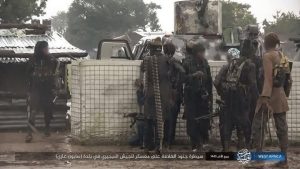
In a brazen and meticulously coordinated attack, the Islamic State West Africa Province (ISWAP) launched a devastating assault on a Nigerian Army base in Borno State, resulting in significant military casualties and the destruction of critical assets. The insurgents claim to have killed numerous soldiers and obliterated 12 armored tanks and several vehicles during the onslaught.
The attack unfolded in the early hours of January 6, 2025, targeting the military installation in Kareto village, situated approximately 153 kilometers north of Maiduguri, the capital of Borno State. Kareto houses the Nigerian Army’s 149 Battalion, a unit actively engaged in counter-insurgency operations against ISWAP and its rival faction, Boko Haram.
Eyewitnesses and military sources report that the insurgents approached the base under the cover of darkness, utilizing sophisticated weaponry and tactical maneuvers to overwhelm the stationed troops. The assault initiated with a suicide car bomb attack, causing significant structural damage and sowing chaos within the base. This initial breach was followed by a relentless barrage of gunfire and rocket-propelled grenades, leading to a fierce firefight that lasted several hours.
In the aftermath, ISWAP released photographs purportedly depicting the scale of destruction inflicted upon the military facility. The images showcase smoldering remains of armored tanks, charred military vehicles, and the bodies of fallen soldiers, underscoring the group’s intent to project strength and sow fear.
This attack is part of a series of escalating assaults by ISWAP in the region. In November 2024, jihadists linked to the Islamic State group killed six soldiers in a raid on a military base in northeastern Nigeria. Similarly, in November 2021, a Nigerian army general and three soldiers were killed during an attack by ISWAP militants in Borno State.
The Nigerian military has faced significant challenges in curbing the insurgency, despite ongoing efforts to bolster security and implement counter-terrorism strategies. The persistent attacks have not only resulted in military casualties but have also had severe repercussions on civilian populations, leading to displacement and humanitarian crises.
In response to the latest attack, the Nigerian Army has launched a search and rescue operation to locate missing personnel and assess the full extent of the damage. Military authorities have reiterated their commitment to combating insurgency and have called for increased vigilance and cooperation from local communities to aid in intelligence gathering and early warning mechanisms.
The resurgence of ISWAP’s activities in the Lake Chad Basin poses a significant threat to regional stability. The group’s ability to execute large-scale attacks against military installations indicates a concerning level of operational capability and resource access.
Analysts suggest that the Nigerian government, in collaboration with neighboring countries, must reassess and enhance their counter-insurgency approaches. This includes addressing underlying socio-economic issues that fuel recruitment into insurgent groups, improving military logistics and intelligence capabilities, and fostering regional cooperation to effectively combat the transnational nature of the threat.
As the situation unfolds, the Nigerian populace remains on edge, with calls for the government to take decisive action to ensure the safety and security of its citizens. The international community continues to monitor developments closely, emphasizing the need for a comprehensive strategy to address the multifaceted challenges posed by ISWAP and similar extremist factions in the region.
Peoplesmind
